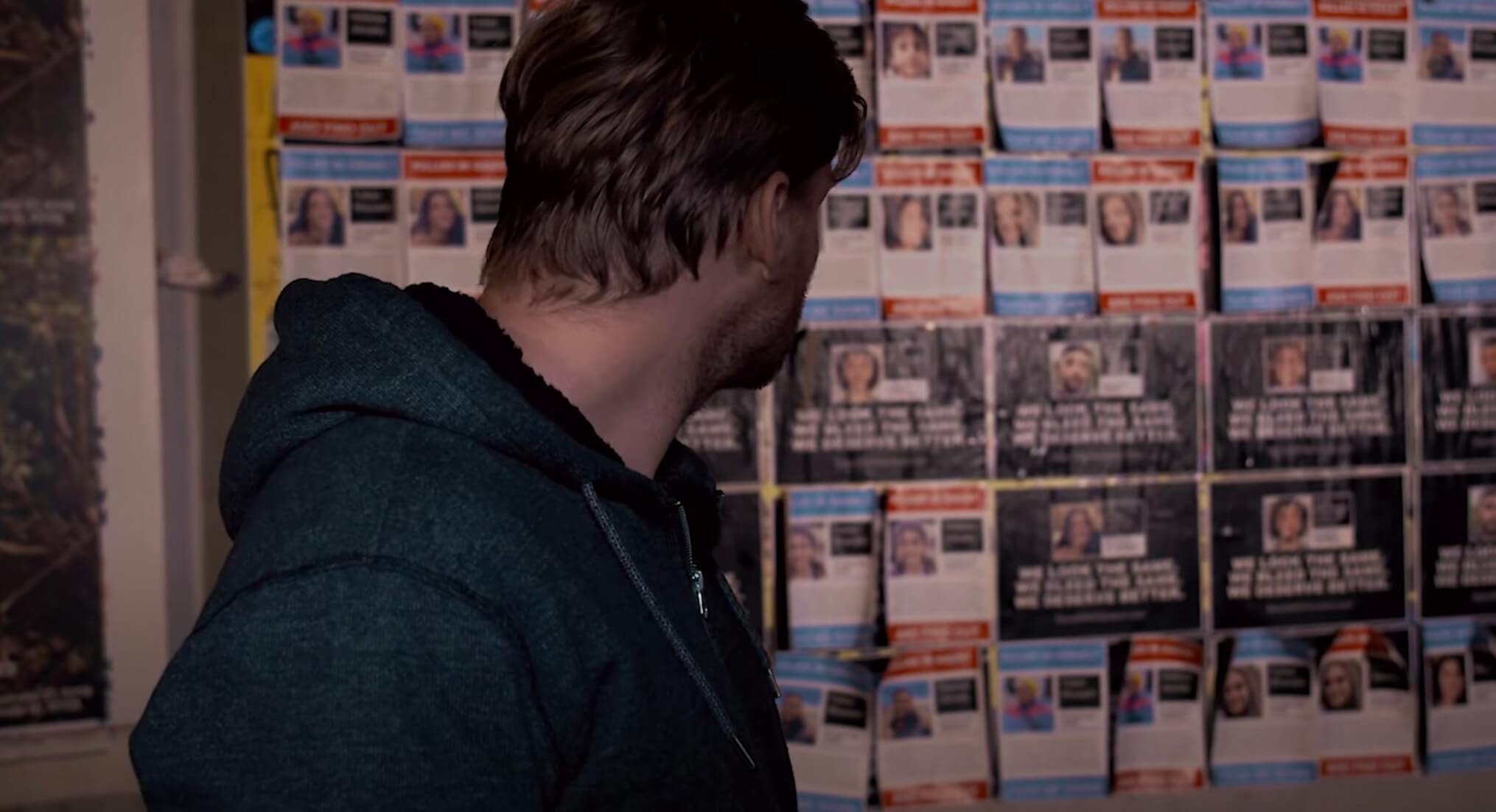Why an Israel-born comic is hoping his latest act becomes irrelevant as soon as possible
For Shahak Shapira, there is power and relief in responding to the war with comedy

Graphic by Angelie Zaslavsky
Shahak Shapira turned to comedy first. Three days after the Hamas attacks, the Israel-born, Berlin-based comedian had a German-language stand-up show to do. It was a tryout kind of evening, one where he brings his notebook up to the mic with him and tests out new material. His first question on Oct. 10 was whether to even get onstage that night. And if he did, should he talk about what was happening in Israel — and everywhere else?
“But you can’t really not talk about it. It was very present,” he told me over Zoom a month and a half later. So he tried out some unrelated jokes, then asked the crowd if they wanted him to go there. With the audience’s green light, he spent the rest of the show improvising material on Israel and Palestine.
“When there’s something in the room, or when I think that there’s something in the air, I have difficulties not acknowledging it,” he said. “It’s like seeing an audience member who’s not laughing,” he added, even if they’re surrounded by 100 who are.
In this case, it wasn’t one unsmiling face at a comedy club that he couldn’t ignore, but a barrage of headlines and — among other things — callous reactions to the Hamas attacks. “I can’t remember an event where so many people died and so many people deemed it appropriate to celebrate,” he told me. “They were handing out baklavas here in Berlin.”
When he uploaded the video, people told him there should be an English version too. The English-language mini special he performed on Oct. 15 at a bar run by a Palestinian friend and posted online two days later is titled Baklavas From Gaza: Comic Relief for Israel and Palestine. The two videos have garnered nearly 300,000 views in total.
“If you’re able to make fun, to laugh at certain things instead of crying over them, it kind of regains us a piece of power,” said Shapira.
The show, as Shapira promises in a brief introduction, is “a bunch of half-baked thoughts,” which yo-yo from sarcastic to somber at a fast clip. One minute, he’s giving a shoutout to the Germans in the audience: “Feels good, right? I bet there’s a bunch of Germans going, ‘Oh my god, this is so good, this is not our fault this time.’” Then he’s talking about Bono’s tribute to those slain at a music festival in Southern Israel. “I will never forgive the Hamas,” he says, pausing for effect before adding, “for making me listen to U2. Never again.”
And then he’s talking about the horrifying videos that had started circulating online. “There’s no empathy for anybody else,” he says. “It’s called selective humanism. Selective humanism is the most inhumane thing, that’s the irony of it. You have all the empathy in the world for your people, but none for the other side.”
But joking about it all wasn’t enough. And the truth is Shapira — whose grandfather Amitzur Shapira was one of 11 Israelis killed by terrorists at the 1972 Olympics in Munich and whose other grandfather was a Holocaust survivor — first became famous for projects that weren’t meant to be funny. He’s perhaps best known for calling out people taking selfies, doing yoga, juggling, and otherwise capturing tasteless photos at the Memorial to the Murdered Jews of Europe with his 2017 Yolocaust project.

These days, he doesn’t like to make a habit of getting serious, because doing both can confuse people. At the same time, he’s not limited to comedy. “If I want to say something serious, I’ll just say it in all seriousness.”
As the days went by, he watched videos of people tearing down posters begging for the return of those Hamas had kidnapped and taken to Gaza. “I remember this one video that just stayed with me,” he said. “This mother was putting up posters of her kidnapped children, and someone just took it and he tore them down. And she confronted him and he did not give a shit at all,” he added. “It made me really angry.”
For Stand With Humans, Shapira created pairs of flyers designed to mimic the now-ubiquitous “kidnapped” posters that people are putting up — and others are tearing down — all over the world. Both flyers in each pair show the same snapshot of the same person. Across the top, one flyer says “Killed in Israel?” while its counterpart says “Killed in Gaza?” Across the bottom, there are instructions: “Tear me down and find out.”
“People are so into tearing down posters these days, so I thought I’ll give them ones they can tear down,” Shapira said. When they do, a larger poster underneath reveals the identity of the person pictured and the circumstances in which they were killed, followed by the words: “We look the same. We bleed the same. We deserve better.” It points people to a website that recreates a similar experience with a grid of photos that reveals each person’s identity and story when you hover over it.
“I wanted them to see a person first before they see an Israeli or a Palestinian. So I presented them with a question and I showed them a picture, but I didn’t show them anything else,” Shapira said.
A three-minute video released with the project follows Shapira as he pastes posters and staples flyers on top of them on a wall in the Kreuzberg district of Berlin, and later as some passersby stop and engage with them. In a voiceover, Shapira talks about the impetus behind the project, which explores the ideas of empathy and selective humanism.
“I don’t think there’s been another conflict where you’ll see so many humans give their whole heart to one group of people, but have absolutely zero empathy for another,” Shapira says at the start of the video. The people on the posters “were all very different people, but the one thing they have in common is that none of them deserved to die,” the voiceover continues. “We are at the very sad point where we have to remind ourselves how to be a human being,” he says, concluding that this conflict “only ends when you see both sides, and both sides see each other.”
It’s all jarringly poignant and earnest when you think back to the comedian making jokes about who makes the best hummus (according to Shapira, it’s Palestinians in Israel, and the secret ingredient is anger) and how he wishes for Palestinians to “do so well that they live like a white woman in San Francisco.”
“It was very hard to find the words that don’t feel corny, without feeling like an idiot or cracking a joke,” Shapira told me. “I guess I’m one of those people that need to, every time they show just the smallest piece of emotions or intimacy, they need to break it off with sarcasm and humor.”
Shapira isn’t planning for the Israeli-Palestinian conflict to become his “thing,” neither within comedy nor outside of it, and instead has plans to continue touring with his stand-up next year and to record a new special. “I hope that this gets irrelevant as soon as possible,” he said.























